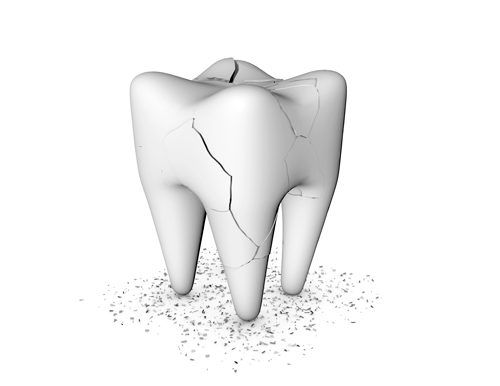Dental pain
Toothache, also known as dental pain, is pain in the teeth or their supporting structures.
Common causes include inflammation of the pulp, usually in response to tooth decay, dental trauma, or other factors, dentin hypersensitivity, apical periodontitis (inflammation of the periodontal ligament and alveolar bone around the root apex), dental abscesses (localized collections of pus), alveolar osteitis ("dry socket", a possible complication of tooth extraction), acute necrotizing ulcerative gingivitis (a gum infection), temporomandibular disorder.
Call us now if you have a dental emergency
Pulpitis is reversible when the pain is mild to moderate and lasts for a short time after a stimulus (for instance cold), or irreversible when the pain is severe, spontaneous, and lasts a long time after a stimulus. Left untreated, pulpitis may become irreversible, then progress to pulp necrosis (death of the pulp). Abscesses usually cause throbbing pain.
The apical abscess usually occurs after pulp necrosis, the pericoronal abscess is usually associated with acute pericoronitis of a lower wisdom tooth, and periodontal abscesses usually represent a complication of chronic periodontitis (gum disease).
The treatment of a toothache depends upon the exact cause, and may involve a filling, root canal treatment, extraction, drainage of pus, or other remedial action. The relief of toothache is considered one of the main responsibilities of dentists. Toothache is the most common type of pain in the mouth or face It is one of the most common reasons for emergency dental appointments.

Dental trauma and cracked tooth
Cracked tooth syndrome refers to a highly variable set of pain-sensitivity symptoms that may accompany a tooth fracture, usually sporadic, sharp pain that occurs during biting or with the release of biting pressure, or relieved by releasing pressure on the tooth. The term is falling into disfavour and has given way to the more generalized description of fractures and cracks of the tooth, which allows for the wide variations in signs, symptoms, and prognosis for traumatized teeth. A fracture of a tooth can involve the enamel, dentin, and/or pulp, and can be orientated horizontally or vertically. Fractured or cracked teeth can cause pain via several mechanisms, including dentin hypersensitivity, pulpitis (reversible or irreversible), or periodontal pain. Accordingly, there is no single test or combination of symptoms that accurately diagnose a fracture or crack, although when pain can be stimulated by causing separation of the cusps of the tooth, it's highly suggestive of the disorder. Vertical fractures can be very difficult to identify because the crack can rarely be probed or seen on radiographs, as the fracture runs in the plane of conventional films (similar to how the split between two adjacent panes of glass is invisible when facing them).
When toothache results from dental trauma (regardless of the exact pulpal or periodontal diagnosis), the treatment and prognosis is dependent on the extent of damage to the tooth, the stage of development of the tooth, the degree of displacement or, when the tooth is avulsed, the time out of the socket and the starting health of the tooth and bone. Because of the high variation in treatment and prognosis, dentists often use trauma guides to help determine prognosis and direct treatment decisions.
What to do if you have a dental emergency during your holidays in Crete
Some dental problems are serious enough to warrant a hospital visit. If you experience any of the following you should go straight to your local hospital:
- Significant bleeding that won’t stop
- Trauma to your face, mouth or teeth from an accident
If a tooth has been knocked out, it’s important you get to a 24-hour emergency dentist as quickly as possible. The sooner you can receive treatment, the better the chance your dentist will be able to successfully re-implant the tooth. Try to gently place the tooth back in its socket, but if this isn’t possible, keep it in a glass of milk while you get medical assistance.
You may be able to find a local walk-in dentist that can provide you with the treatment you need straight away.
How to find an emergency dentist near me?
If you experience severe tooth pain you should make an emergency appointment.
If you have a dental emergency during regular working hours, you can make an emergency appointment within office hours. Contact us by telephone and we will do our best to fit you in quickly. We will build time into our schedule that allows us to see patients at short notice if urgent dental treatment is needed.
Out-of-hours dentist appointments
Things get more complicated if you need urgent dental care in your area at night or on days when clinics are usually closed. This will require an out-of-hours dentist.
We are here for you because we know that dental emergencies don’t always occur during normal business hours.
Private emergency dentist cost
Emergency dentist costs will be, understandably, a little bit higher.
Usually, the cost could vary from 70€ to 100€ depending on the complexity of the case. There are some cases in which the cost could be higher than the prices mentioned.


